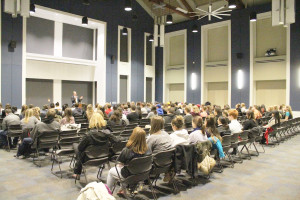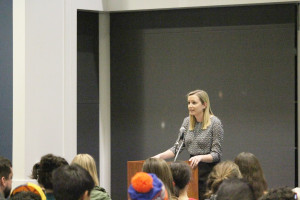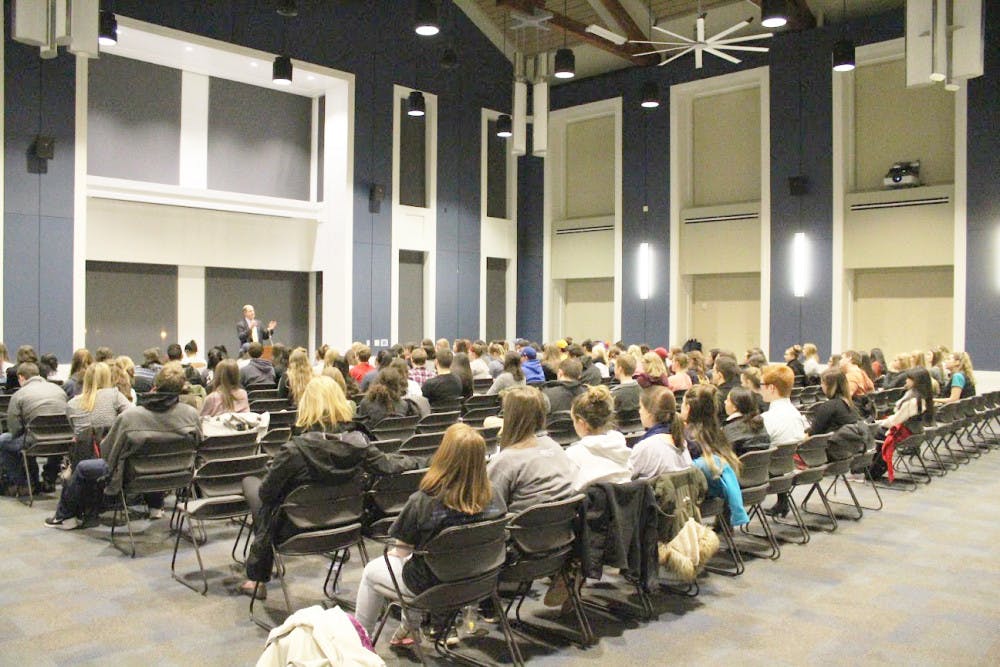By Craig Dietel
Correspondent
On Thursday, March 3, the second floor of the Education Building was more than just a place where one could find classrooms and conference rooms. It was a safe, sheltered and accepting environment where students and professors freely expressed their frustration over the word “retarded,” which has been deemed the “R-word.”
The student-run organization Best Buddies held its annual “Spread the Word to End the Word Week” from Monday, Feb. 29, to Friday, March 4. They set out to expose how harmful using the R-word can be. According to Best Buddies, “The R-word is a derogatory term that has the potential to hurt families across the nation.”
If this derogatory word brings more harm than good, why use it at all? This was one of the many questions School of Education Dean Jeff Passe addressed in his opening speech at the R-Word Monologues.

“People have a natural tendency to put things into categories,” Passe said. “It is helpful to do that when it works. To try and make a point, we use hyperbole. We exaggerate.”
Passe cited how “idiot,” “imbecile” and “moron” were all formerly used to describe how many I.Q. points a person had, but are now words used to insult and mock others. The same concept applies for the use of the word “retarded.”
“People don’t always know the meaning or origin of words, nor do they know the harmful effects of words. We need to educate them,” Passe said.
Passe was not the only individual to stand up and speak against the use of the R-word. Eight others took a stance against the use of this derogatory word. Speakers of the night ranged from current students to graduates.
Junior business management major Catherine Killian spoke about the effects of the R-word on her life. Her oldest sister, Jessica, was born with cerebral palsy and is unable to move her left hand. However, Jessica hasn’t let her disability hinder her ambition to succeed and determination to overcome the obstacles that stand before her, Killian said.
Jessica recently graduated Monmouth University in West Long Branch, N.J., and has since gone on to become a teaching assistant who helps others with special needs.

According to Killian, though, her sister’s journey there was not an easy one. Jessica was laughed at and dismissed outright at one of her first interviews simply because of her disability.
“The hateful words demoralized my sister,” Killian said.
After the interview, Jessica was shaken to her core, but she refused to give up on her dream. She applied to other schools and eventually landed the job she had been seeking, Killian said.
Killian told the crowd that her sister is one of her greatest inspirations in life.
“She’s the reason why I am Catherine Killian and I love her every day for it,” she said.
Many students from the College’s Career and Community Studies Program also took to the stage to tell their stories at the monologues. Among them were junior Katie Burns and freshman Shawna Dedonado. Their stories were empowering and touched on how rude and hurtful the use of the R-word can be, even if it is said jokingly.
Aside from the R-Word Monologues, Best Buddies put on a fantastic week of events aimed at raising awareness for the harmful effects of the R-word and encouraging people to think carefully about the words they use.
The week began with a movie night on Monday, March 1, when the group showed the film “Where Hope Grows,” which centers around the friendship between an ex-baseball player and a man with Down Syndrome. Later in the week, the group supported the (DIS)ability Monologues hosted by the Students for Disability Awareness Club. The organization also held a fundraiser at RedBerry in Campus Town and ended the week with a celebration in the Decker Social Space on Friday, March 4.
“This year, we were trying to reach a wider audience and, for the most part, any person we can reach, we take that as a success,” said Abbi Anker, a special education and sociology double major and president of Best Buddies. “We take what they learn and what they see and spread that to their friends, and that is what we are really trying to accomplish. Through education and awareness, we can spread acceptance through our TCNJ community, because language affects attitudes and attitudes affect action.”







